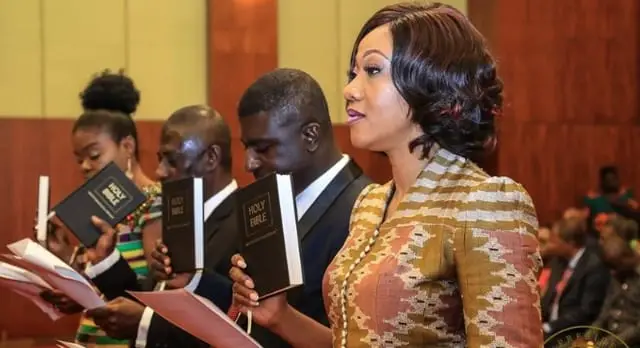Should Jean Mensah Disenfranchise the People of the Volta, Oti, and Parts of the Current Northern Regions to make Ghana’s 2024 Election Credible?
Per available documents, Ghana Attorney General and the United Nations have acknowledged the fact that Ghana-British Togoland union agreement do not exist, they don’t have it. Which means that the social construct of the people of British Togoland cannot be determined. Why then should they be allowed to vote in Ghana’s general election?
- Advertisement -
In my opinion, over the years, the acts of casting votes for persons to steer the affairs of Ghana has not been credible since citizens and non-citizens are allowed to participate in such an important decision making, reserved for only legitimate citizens of Ghana who have attained the legal age of 18 and above with sound mind. I hold the view that the people of the Volta, Oti and part of the current Northern regions are not de-jury Ghanaians and for that matter should not be allow to vote in Ghana’s general elections since that turns is contrary to Ghana’s 1992 constitution and discredit Ghana’s election.
It is a fact that the forebear of the above mentioned people are part of the United Nations (UN) trust territory called the British Togoland and not part of the British colony, the Gold Coast that became Ghana. This truth is known to all Ghanaian politicians and political party activists but am not sure if the electoral commissioner (EC) Mrs. Jean Mensah is aware of it.
- Advertisement -
During Ghana’s 66th independence celebration, The President of the republic, Nana Addo Dankwa Akufo-Addo in his speech said “An important historical fact is that, of all the different peoples that have formed our modern nation, it was only the people of the Volta, Oti and part of the current Northern Regions who had the unique opportunity to choose to join the territory that became Ghana at independence. I am referring, of course, to the 1956 plebiscite in which, on May 9th of that year, the people of the then British Togoland voted to join the Gold Coast on the attainment of her independence a year later. Without that significant historical event, we would not have Ghana as we know it today.” The President have spoken the truth and drew the thin line between the British Togoland and the Gold Coast.
- Advertisement -
The 1956 plebiscite was a UN recommendation through UN resolution 944(X) to ascertain the wishes of the trust territory in question, whether to join their territory with self-governing Gold Coast in a union or separation of the Togoland under British administration from the Gold Coast and its continuance under trusteeship, pending the ultimate determination of its political future. It is a huge political decision, which of course would determine immediate and future destiny of the British Togoland, yet is in line of safeguarding the human rights and avoidance of future implications.
At this juncture, it is imperative to note that the people of the British Togoland voted for a peaceful political union with self-governing Gold Coast (Ghana). This further pushes the UN to enact UN resolution 1044(XI) to mandate the administering power, Britain, to take such steps to bring about the union in order to give British Togoland a proper and lawful belonging. Yet what was given to them was a mind boggling and unacceptable absorption of the British Togoland into Ghana without any constitutional rights.
The people of whom President Nana Addo referred to as, have the unique opportunity to choose to join the territory that became Ghana at independence can only be or regarded or accepted as Ghanaian when the union that they voted for is consummated with union agreement and union constitution to give legal backing to the union and safeguard the liberty of the two states.
- Advertisement -
Per available documents, Ghana Attorney General and the United Nations have acknowledged the fact that Ghana-British Togoland union agreement do not exist, they don’t have it. Which means that the social construct of the people of British Togoland cannot be determined. Why then should they be allowed to vote in Ghana’s general election?
Article 42 of Ghana’s 1992 constitution state; “every citizen of Ghana of eighteen years of age or above and of sound mind has the right to vote and is entitled to be registered as a voter for the purposes of public elections and referenda.” And who is then considered here as a citizen? Article three, clause one, of the 1992 constitution state; “every person who, on the coming into force of this constitution, is a citizen of Ghana by-law shall continue to be a citizen of Ghana.”
It is clear that in absence of Ghana-British Togoland union agreement and union constitution, there is nothing or no law that can make the people of the British Togoland citizens of Ghana before coming into force of the 1992 constitution of Ghana that would warrant them the right to vote.
Since it is the 1992 constitution that established the Electoral Commission and allocate its powers, and as well as define who a citizen is, and determine who have the right to vote, the electoral commissioner must make sure that citizenship of persons registered to vote can be determined. According to the constitution, voting is not open to all persons living in Ghana, rather, it was limited to certain class or category of citizens of Ghana and the electoral commissioner, Mrs. Jean Mensah must be able to determine who falls within the voting category in discharging of her duty in the spirit of making Ghana’s election credible.
It is against this backdrop that I am of the opinion that citizenship of the people of the British Togoland cannot be ascertained and therefore they should not be allowed to vote. Thank you.
By Seth Mifetu
- Advertisement -


